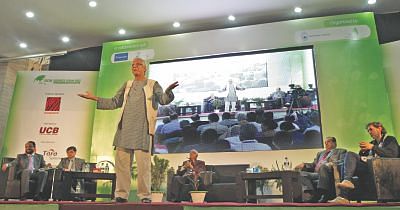Universities must have social goals

Nobel Laureate Prof Muhammad Yunus addresses the "Social Business Forum 2012" at the North South University in Dhaka yesterday. From Left…Commerce Minister GM Quader, Dean of School of Business at the NSU Prof Abdul Hannan Chowdhury, NSU Vice-Chancellor Prof Hafiz GA Siddiqi, NSU Board of Trustees Chairman MA Hashem and Hans Reitz, managing director of the Grameen Creative Lab in Germany, are also seen on stage. Photo: STAR
Nobel Laureate Prof Muhammad Yunus yesterday urged universities to write new textbooks to open up the minds of students to new ideas and systems of doing businesses as the existing economic model was not working, as seen in the developed world.
He said profit maximisation could not be the only goal of a business. They must have “social good” also as a goal. “We are teaching students to be good and skilful professionals. But we do not teach them how to choose the main goal of life.”
"Everything is job oriented. Can it be the meaning of education, only to find a job? It teaches that the more money you can earn the more successful you are."
Definition of “success” should include service to society, to have empathy for the poor, he added.
Prof Yunus called on the universities to become true “knowledge hubs” and spread the knowledge out of the campus so that people benefit.
The microcredit pioneer was speaking at the opening ceremony of "Social Business Forum 2012" at the North South University in Dhaka.
The founder of Grameen Bank said the current economic system was not appropriate to solve all the problems faced by the people, as it emphasised the making of money.
He said conventional business was designed in such a way that profit maximisation becomes an obsession. "In the process, we have created many problems. As a result, the world has become a mess."
Prof Yunus said due to rising problems, people had become confused and did not know what to do.
"This makes social business so very relevant as it is dedicated to solving problems," he said.
He said money-making could be a means, but cannot be an end, and should not be the purpose of life. "Money-making could be a means, but using this money for solving social goals should be the end."
Commerce Minister GM Quader said social business originated from Bangladesh. "We are proud of it. It is our product."
He said businesses were very essential for a society and they would also make profit to be sustainable. But they should not be profiteering.
"Bangladesh needs businesses such as social business."
He said the younger generation could move forward with this idea.
NSU Vice-Chancellor Prof Hafiz GA Siddiqi said Prof Yunus had long been known for his microcredit concept, which had been copied in most countries throughout the world.
"Now he has presented the world another idea--social business."
NSU Board of Trustees Chairman MA Hashem said the society and the nation would benefit from such a novel idea. "It will help us build a peaceful world. It will add a new dimension to business."
Prof Abdul Hannan Chowdhury, dean of School of Business at NSU, said social business was all about doing good for humanity, rather than making personal profits, a major goal for conventional businesses.
He said the new business model could transform the economic and moral history of the world forever. "And how fortunate we are that none other than our own Prof Muhammad Yunus has offered the world that possibility--not just a theoretical framework, but in practice."
Prof Abdul Hannan said the world was gradually moving towards new paradigms in business and entrepreneurship. "Let us be a part of that great movement."
Foreign diplomats, economists, civil society members, politicians, and academia and university students attended the event.
Later at a panel discussion on "Social Business: A New Path for Corporate Leaders", the Nobel peace prize winner said social business was not an isolated issue. One would not have to distance him or herself or give up everything to set up a social business, Prof Yunus said.
"Social business can run parallel to traditional business. Every business can do social business alongside their conventional business. Any big business can do it to solve a social problem."
Prof Yunus said social business should not be seen as an opponent to the charities.
"I am not against charity, but charity has some limitations."
He said in most cases of charities, the donors write cheques and give away the money and forget about what has had happened to the recipient.
In the case of charity, it would not be asked whether the purpose for which the fund was spent had been achieved, he said.
"The companies are not involved with it any longer. But in case of social business the owners employ creative power and set up the business out of personal pleasure and to solve a social goal. It is not giving up ownership."
He said universities could set up social business fund and could be a matchmaker between the funds and the students with good ideas.
Prof Yunus also said the difference between corporate social responsibility and social business was that the former was not a business, while the latter was a business.
The commerce minister said social business was an interesting concept. "I think it is the integration of businesses and social work."
He said it was acceptable and ethical that businesses would make profit. Businesses have to make profit to be sustainable but making too much was not acceptable, which amounts to profiteering.
"Social business is a service to the society," said the minister.
He also said the government could play an important role in promoting ideas like social business.
Munawar Misbah Moin, a group director of Rahimafrooz, narrated how his company successfully replicated the model of Grameen Shkakti, a social enterprise set up by Prof Yunus, and built a successful business selling solar energy solutions.
Mahfuz Anam, editor and publisher of The Daily Star, moderated the discussion. He said questions have to be asked whether the world would last with the way "we are running our society and businesses".
He said Bangladesh had a long tradition of philanthropy through which schools, colleges and hospitals were set up with charitable funds. "But charity is a one time spending for social good, and therefore unsustainable."
"But through social business the initial fund can be made to produce wealth, which through reinvestment can become sustainable.”
In another panel discussion on "Women Empowerment through Social Businesses" Rokia Afzal Rahman, a former caretaker government adviser, said the youth should be particularly encouraged to set up social businesses as they often come up with innovative ideas.

 For all latest news, follow The Daily Star's Google News channel.
For all latest news, follow The Daily Star's Google News channel. 




Comments